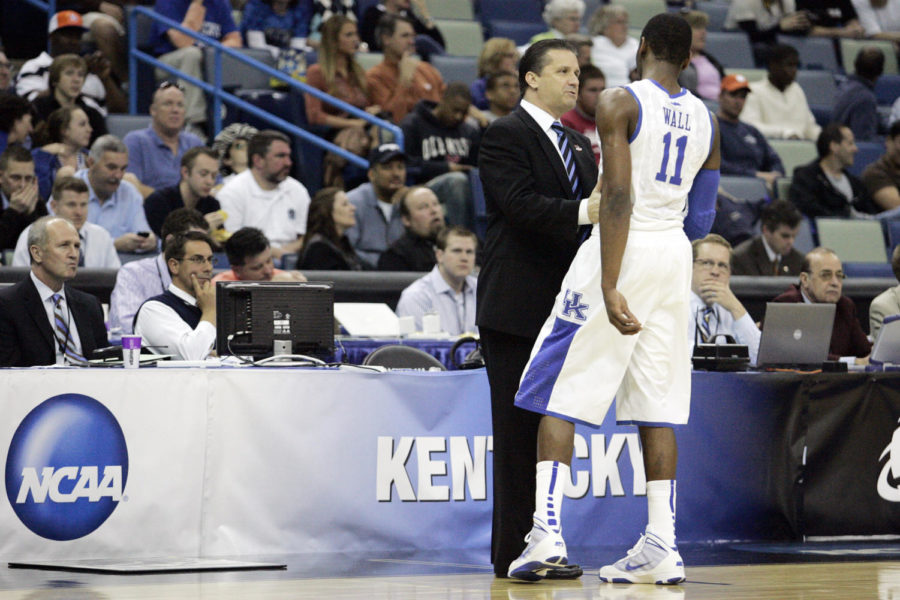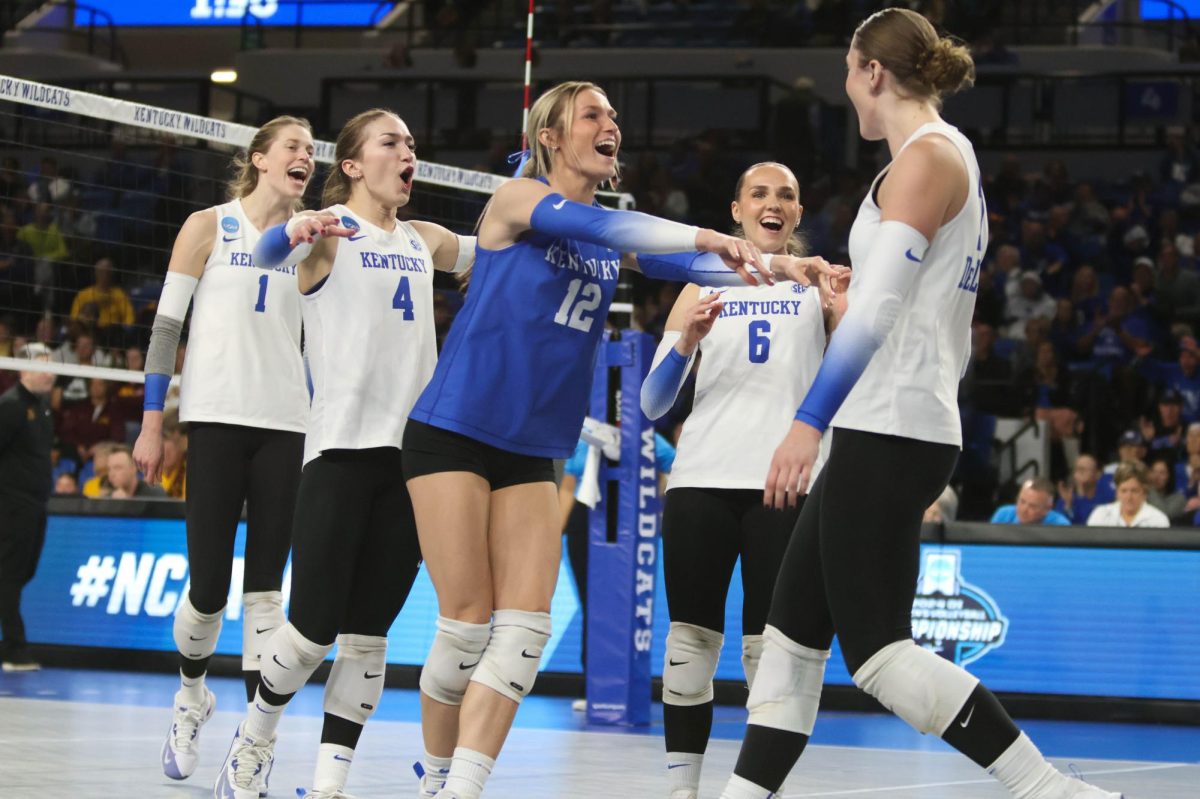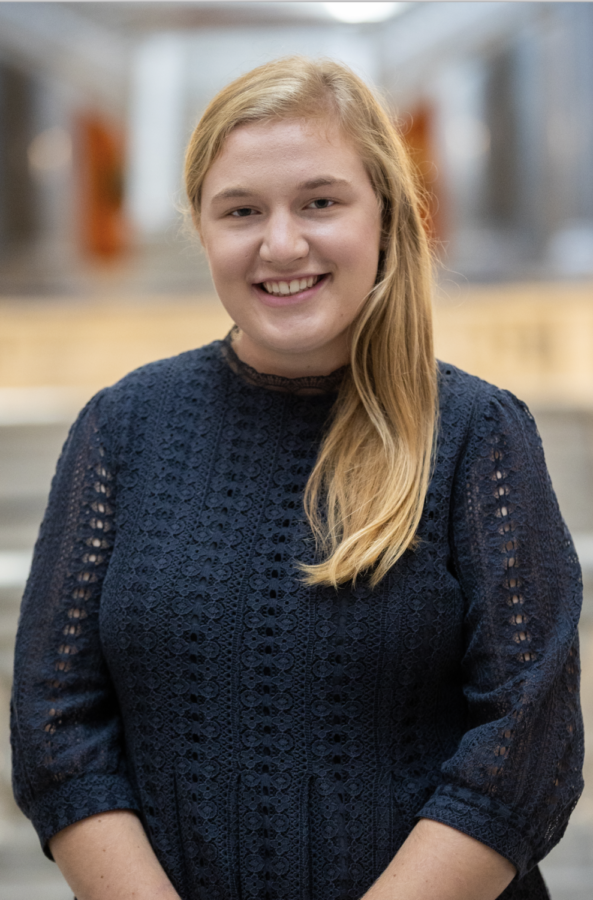A warranted extension
2020 – 2021 editor-in-chief Natalie Parks poses for a photo inside the Kentucky State Capitol building in Frankfort, Kentucky following oral arguments in the case of the University of Kentucky vs. the Kentucky Kernel before the state Supreme Court in October 2020. Photo by Michael Clubb | Staff
May 3, 2021
I would like to apologize for the first part of this column, which you can find here and here. Though I was right to say it (and have the right to say it), I should not have lashed out and been cruel in doing so. Though I’d like to delete all evidence of this shameful tirade from the internet, I’ll leave it up as a reminder to myself and other journalists to edit more than you write and think more than you edit.
I was wrong to let my emotions cloud my judgement and publish the earlier column, which I think you’ll find savors strongly of bitterness. In particular, I owe an apology to the subjects of my frustrations for the public display. Nor did I say enough about my own failings, like how I struggle to ask for help.
If you were really upset by the earlier column, as I am, please know that I regret it deeply and my conscience is exacting a thorough punishment – far more critical than any stranger could be.
I was – still am – upset that the COVID-19 pandemic kept me from having a good editorship. I was thinking only of myself, and though I do think I needed to say those things just once, this is neither the time nor the place. There’s therapy for that.
To be clear, I stand by what I wrote and it is a faithful representation of my feelings – just not a mature or appropriate outlet for them. Nothing I said was incorrect, and I do feel very strongly about the responsibilities the journalism field has to up and coming reporters, particularly if these reporters are to bear the weight of a struggling industry.
Part of why I wrote the original letter is because I don’t want other young journalists to be treated the way I have been treated; that is, both taken advantage of and taken for granted. Still, letting my personal feelings about my editorship color my thoughts on the industry betrays that lesson and was a poor rhetorical choice. I don’t want this extension to detract from the message of that first column, which can stand fully on its own.
But the previous column does a disservice to the journalists I work alongside and those in the overall field. There is no overstating the importance of local journalism, nor exaggerating the sacrifices journalists make to serve their communities, nor the passion and skill with which they approach their craft. I am afraid that the previous letter embodies a disdain far greater than what I truly feel. I myself am indebted to many career journalists for their support, guidance and clear reporting that helped a Tennessean learn the lay of the land in Kentucky.
In particular, I was remiss not to be more explicit in my thanks for those that have been supportive of me this year, as people are associated with the Kernel are far more likely to be than those on the outside. I hope that those individuals know how appreciative I am of their efforts, but I suspect that I have been remiss in showing my thanks as well.
So, if you’ll let me, I’d like to start over by saying what an incredibly tough year this has been for everyone, not just the Kentucky Kernel. When I think of the challenges overcome by us as students, as a staff and as people enduring a global pandemic, I am astonished we put out a paper at all.
That is all to the credit of the Kernel’s staff, who put up with an overbearing amount of nagging and micromanaging from me. Not only did the staff bear the brunt of technically and emotionally challenging news coverage, they also adhered to a strict COVID-19 policy I imposed that included a near total ban on the newsroom.
I am proud to say that we had no staff-to-staff transmission of COVID-19. Though we were safe, I know that those precautions were also a significant barrier, not only to the operation of the paper, but to forming the relationships and camaraderie so crucial to a college newsroom.
Many of our staffers had not met another Kernelite until last week, when we hosted our first and only in-person meeting, an outdoor picnic to celebrate the end of the school year. My hope for incoming editor Rayleigh Deaton and her staff is that they are able to operate in-person, to make the memories treasured by generations of Kernelites. Some of my bitterness in the first letter is no doubt due to jealousy that I missed out on those experiences.
I hope one day I can look back at my time on the Kernel with more fondness than I currently feel. Part of the motivation behind this extension is that I didn’t want to end my editorship on a sour note. I need to let go, and holding onto grievances will only stand in the way of that and leave me with more regrets.
I think it will take time, first to forget the really terrible parts of the job and then to see the lessons learned for what they are. But the audience of the Kernel shouldn’t have been exposed to the ugly beginnings of that process.
More, though, the bitterness in the first column proved to me that stepping away from the Kernel is the right decision for me. I didn’t used to be bitter. I didn’t used to be like this – angry and small and hurt. I don’t want to be the kind of person I became as editor if that’s what I will feel like. Though I think we should question why what is meant to be a part-time job has transformed me so, I am ashamed to have let this bitterness rule me and take away my sense.
Perhaps most importantly, I forgot the most important lesson journalism can teach us all – words matter. They have power, and rarely can intent be divorced from effect. In my need to be known I failed to remember that a good editor shouldn’t be at the forefront of a paper, though I want to emphasize that no one can pour endlessly from themselves without affirmation.
My cardinal error was allowing my personal grievances to overflow and overshadow the real concerns I expressed, and for allowing my feelings to decide what was and wasn’t publishable. This was a basic violation of what an editor is supposed to do, and I should have known better.
I hope also that the earlier column did not discourage other student journalists from taking a chance and working for the Kernel. There is no better way to grow as a young journalist than to work for a college newspaper. Just because the profession wasn’t right for me, doesn’t mean it isn’t right for someone else, so if you are at all interested, reach out right away.
There are good things about being a student journalist, though you wouldn’t know it by talking to me. Though I had the burden of being editor-in-chief during COVID-19, I also had the privilege of documenting this historic era. When I reflect on the stories and interviews I’ve done for the Kernel, I am awed by the strength of the human spirit, how resilient we are and how determined we are to see the good. That’s something I might not have seen if it weren’t for the opportunities I had through the Kernel.
And, I had the honor of being editor-in-chief for the hopeful conclusion of the University of Kentucky’s lawsuit against the Kernel. Words fail me to describe how deeply this case impacted generations of Kernelites. I hope both the precedent set by our case and our dedicated pursuit of it demonstrate the vital need to protect journalism as a function of our democratic society.
At the end of the day, the Kentucky Kernel is and has been an embodiment of the role journalism plays in a community. One of the few pleasures of the job is holding those in power accountable for their actions. Part of accountability is knowing when to take responsibility for your own choices, and that’s what I hoped to do with this letter and as editor. I did so as well as I was able. I can only hope I did it right.
































































































































































